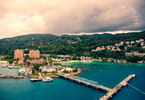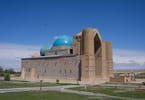Scottsdale’s vital tourism industry, coming off strong gains in the peak season, is now bracing for a potential backlash from Arizona’s immigration reform.
Threatened travel and convention boycotts could not come at a worse time for hotels still reeling from the recession and the so-called AIG effect, with business groups afraid to hold meetings in luxury resorts.
“It feels like we’re being picked on,” said Pamela Gilbert, Fairmont Scottsdale marketing director. “You develop a complex.”
The 650-room Fairmont resort rebounded this winter season after losing more than 9,000 room nights in canceled group meetings in the first quarter of 2009, she said.
Tourism leaders now fear that this year’s hotel-performance gains will not hold up if conventions pull out and vacationers stay away.
“Tourism is very fragile,” said Andrew Chippindall, Hotel Valley Ho general manager. “We need all the business we can get.”
Especially since the new Talking Stick Resort is adding 500 rooms to the local market.
In the first quarter, visitors filled three out of four Scottsdale hotel rooms, an increase of 12.6 percent from a year earlier, according to Smith Travel Research.
Average room rates, however, fell 8.4 percent from a year ago to $168.83, and down $65 from two years ago.
Still, higher occupancy helped drive a 3 percent gain in revenue per available room, a key industry measure of hotel occupancy and rates.
Brent DeRaad, Scottsdale Convention and Visitors Bureau executive vice president, said the recession is showing signs of easing up, consumers are more willing to spend on travel and a harsh winter helped bring more visitors to Scottsdale this year.
Cactus League visitors also helped fill rooms in March. The San Francisco Giants led the league in attendance with 155,819 at Scottsdale Stadium. Typically, about half of those fans are from out of town.
“We’ve has a surprisingly good season,” said Jim Hollister, FireSky Resort and Spa general manager. “But I don’t want to be too overexcited about it.”
The downtown resort manager said lower rates have repositioned Scottsdale and made it more affordable for business groups that might have been priced out of this market in the past.
Scottsdale is a buyer’s market for business groups and those that do come are spending less on their food, beverage, and entertainment tabs, hoteliers say.
They say groups are cautious about booking too far ahead because of the fragile economy.
Gilbert, the Fairmont marketing director, said she expects a gradual recovery in tourism with bookings stronger in 2012 than next year.
But at this point, there is a lot of uncertainty over how severely a travel boycott could stall Arizona’s tourism recovery.
Debbie Johnson, Arizona Hotel and Lodging Association president, said she is aware of eight canceled business meetings, including an immigration lawyers group that had been slated to stay at the Camelback Inn in Paradise Valley.
The association is trying to put together figures on how many room nights hotels statewide have already lost.
“We really don’t need another hit,” Johnson said of the tourism industry, which provides jobs for more than 200,000 people.
She bristles at boycott advocates, noting that a boycott will disproportionately punish hotel service workers. Those workers, many of them legal immigrants and Hispanics, are the very people that the advocates are trying to help, Johnson said.
“These are people who deserve to be able to earn their paycheck every month,” she said.
Calls to the statewide hotel group are running about 20-to-1 in opposition to the immigration-reform law, Johnson said.
“We’re getting a lot more calls from people saying ‘Heck no, we’re not coming to Arizona’ for every one from someone saying, ‘We’re coming to Arizona, and we might even move there.'”
Scottsdale tourism executive DeRaad said a boycott has the “capability of impacting us for months and years to come.”
He recalls a similar boycott in the 1980s over the Martin Luther King state holiday.
“That truly impacted the sports and tourism industry for a number of years,” DeRaad said. “Eventually, we came through it.”
WHAT TO TAKE AWAY FROM THIS ARTICLE:
- Brent DeRaad, Scottsdale Convention and Visitors Bureau executive vice president, said the recession is showing signs of easing up, consumers are more willing to spend on travel and a harsh winter helped bring more visitors to Scottsdale this year.
- Threatened travel and convention boycotts could not come at a worse time for hotels still reeling from the recession and the so-called AIG effect, with business groups afraid to hold meetings in luxury resorts.
- Debbie Johnson, Arizona Hotel and Lodging Association president, said she is aware of eight canceled business meetings, including an immigration lawyers group that had been slated to stay at the Camelback Inn in Paradise Valley.






















